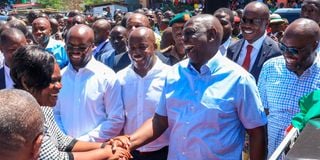Ruto’s visits to all parts of Kenya laudable

President William Ruto and Homa Bay Governor Gladys Wanga share a light moment when they went to officially commission the Homabay Market on January 13, 2023.
Until the philosophy,
Which holds one race superior
And another inferior,
Is finally and permanently
Discredited and abandoned,
Everywhere is war.
Until there is no longer first-class
Or second-class citizens of any nation.
Until the colour of a man's skin,
Is of no more significance than
The colour of his eyes,
I've got to say “war”.
That until the basic human rights,
Are equally guaranteed to all,
Without regard to race, I'll say “war”
Until that day the dream of lasting peace,
World-citizenship and the rule of international morality will remain
Just a fleeting illusion to be pursued,
But never obtained.
And everywhere is war.
War in the east,
War in the west,
War up north,
War down south,
There is war,
And the rumours of war
Until the ignoble and unhappy regime
Which holds all sisters in Africa yeah Sub-human bondage has been toppled,
Utterly destroyed,
Everywhere is war...
— ‘War’, by Robert Nesta Marley
Discrimination is the root of all political upheavals. It does not matter if it is an electoral ward entailing an MCA contest or a region in gubernatorial politics.
Once there is a reasonable feeling of exclusion and discrimination, seeds of regionalism and tribalism will be planted among the excluded population.
Hence it is very easy to cause a political revolution or upheaval in any society. One needs to analyse any society’s schism and uncover the excluded population. You will become the excluded society's darling if you voice their concerns.
Africans revolted against colonialism on the basis of discrimination. Ethnic minorities have seceded in countries such as Yugoslavia, Sudan and Ethiopia on the basis of discrimination. When the Moi government discriminated against alternative voices and banned multi-party democracy in 1982, the chaos of 1990 forced him to return Kenya to a democratic path.
The notion of rebelling on the basis of discrimination applies even in religious matters. If a religion upholds any form of discrimination, it opens itself to possible overthrow by the discriminated lot upon pressure from external forces.
When white missionaries came to black Africa at the turn of the 19th century, they faced resistance from traditional religions. Books like Things Fall Apart by Chinua Achebe illustrate how white missionaries took advantage of a ‘discriminated lot’ to penetrate and vanquish traditional religion.
The whites would ask locals to donate their most hated folks to churches. Often the locals would donate ‘cursed disabled’ persons hoping the churches would collapse under the weight of magical spells.
The 'cursed persons' would flourish in the church, mesmerising locals who had thought the church would perish for such an embrace. That would form the seed population that would lure more people away from traditional religion towards Christianity in the long run.
Love, tolerance
In its gestation stages, Christianity grew on the backs of the discriminated poor. Jesus’ core message was that of love and tolerance. Those that felt discriminated by the rigid Judaist religion flocked to Christianity, aiding its spread.
Likewise, the book Freedom at Midnight by Larry Collins demonstrates how Islam penetrated India. Islam found India under a caste system called Varna, which literally means type, order, colour or class. This was a framework for grouping people into classes first used in Vedic Indian society.
The four classes were the Brahmins (priestly people), the Kshatriyas (rulers, administrators and warriors; also called Rajanyas), the Vaishyas (artisans, merchants, tradesmen and farmers), and Shudras (labouring classes). Islam’s message of brotherhood resonated with the Shudras, who then left Hinduism.
That explains the huge Islamic population of greater India which includes Pakistan and Bangladesh. Modern-day nation builders must therefore spare no effort in uniting citizens and banishing any feeling of discrimination in any country. This ensures the longevity and stability of any nation.
It is on this basis that President William Ruto’s tours around the country, including in opposition strongholds, make a lot of sense.
During such presidential tours, it must be emphasised Kenyans are one nation and deserve development equally, notwithstanding their political stances.
The blood that runs in a Turkana is the same as that of a Borana. No one made an application to be born in North Eastern or Nairobi. The politics of 'us' against 'them' must be buried.
What profits a man to gain the whole world and lose his Kenyan soul? It is not practical or desirable for any single part of Kenya to develop in isolation from the rest. The discriminated 'rest' will conspire and throw out the privileged lot.
Ethnic chieftains
Mt Kenya people are leading the way in this effort of nation-building. For the first time since the reintroduction of multi-party politics in 1990, the region in August 2022 defied its ethnic chieftains and voted for a non-Kikuyu. This embedded its credentials as a region that can be trusted to keep its part of a political bargain.
This nation-building lesson that the Mt Kenya region portrayed needs to be enhanced to tackle any feeling of ethnic discrimination.
The winning UDA must go out of its way to reach out to any region that holds any electoral grievance. All notions of superiority or inferiority in Kenyan society, and Africa generally, must be extinguished for us to achieve universal peace and tranquillity.
The notion of ‘non-discrimination ‘ is at the core of the universal creed of human rights. The intention is clear –to make all humans feel equal and banish all forms of discrimination and hence help in ensuring a peaceful and more prosperous world.
Dr Kang’ata is the Governor of Murang’a County.




